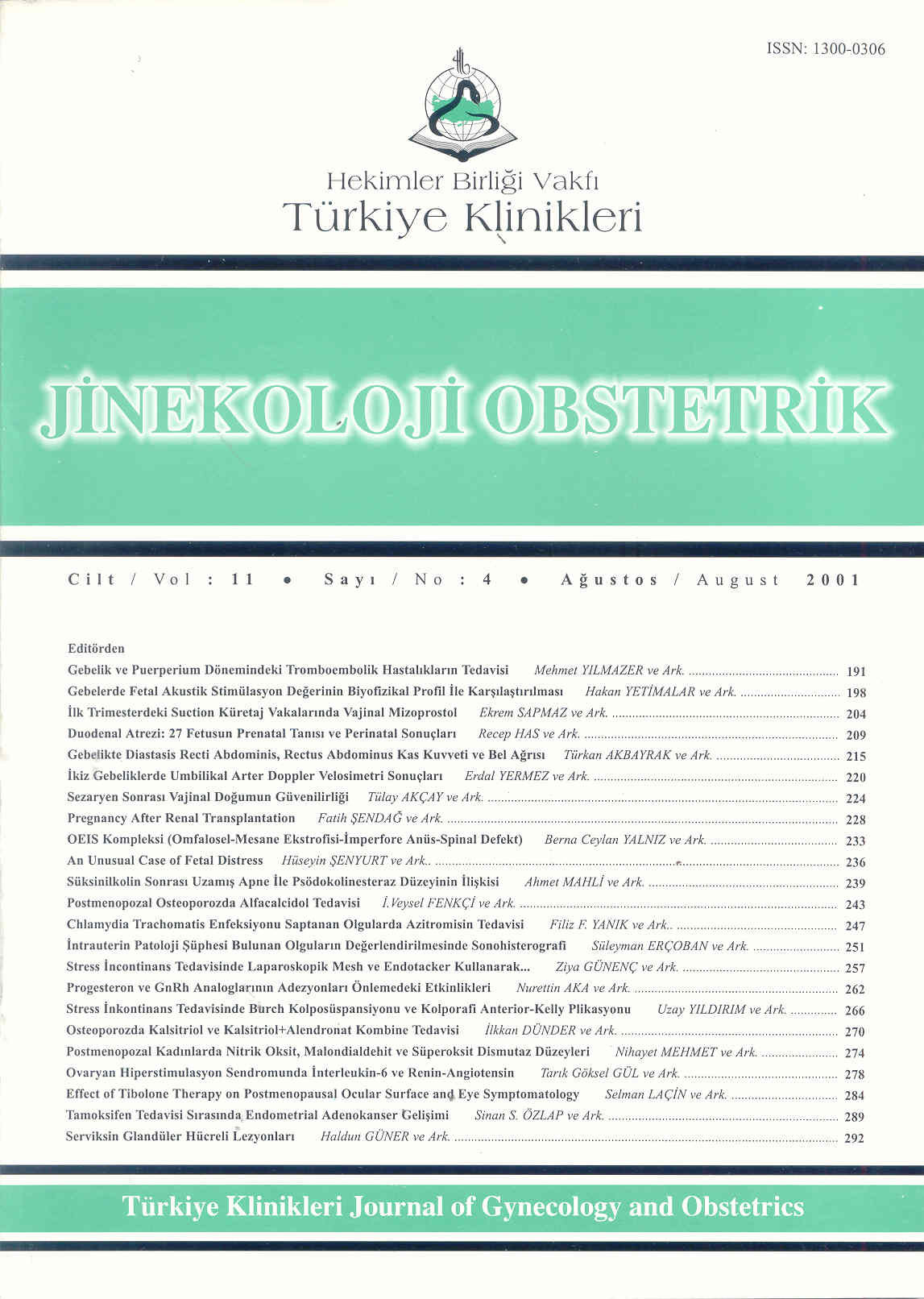Open Access
Peer Reviewed
ARTICLES
3554 Viewed961 Downloaded
Pregnancy After Renal Transplantation: Report Of Five Cases And Literature Review
Renal Transplant Sonrasi Gebeli̇k: Beş Olgunun Sunulmasi Ve Li̇teratür Derlemesi̇
Turkiye Klinikleri J Gynecol Obst. 2001;11(4):228-32
Article Language: TR
Copyright Ⓒ 2025 by Türkiye Klinikleri. This is an open access article under the CC BY-NC-ND license (http://creativecommons.org/licenses/by-nc-nd/4.0/)
ÖZET
Amaç: Doğum çağındaki renal transplant hastalarının önemli bir kısmı gebe kalmaktadır. Bu çalışmanın amacı renal transplant sonrası gebe kalan bir olgu serisinin sunulmasıdır. Çalışmanın yapıldığı yer: Ege Üniversitesi Tıp Fakültesi Kadın Hastalıkları ve Doğum AD, İzmir, Türkiye. Gereç ve Yöntem: Kliniğimizde 1998 ile 2000 yılları arasında gebe olarak izlenen renal transplant hastalarının tıbbi kayıtları retrospektif olarak incelenmiş ve son literatür ile ilgili bilgiler derlenmiştir. Bulgular: Hastaların beşinde de hipertansiyon izlenmiştir. Preterm prematür rüptür sonrası vajinal doğum yapan 24 haftalık gebede neonatal ölüm saptandı. Aynı hastada akut graft rejeksiyonu gelişti. Otuz üç haftalık diğer bir gebelikte intrauterin gelişme geriliği saptandı. Fetal malformasyon hiçbir bebekte izlenmedi. Yüzde seksen hasta (4/5) gebeliği iyi tolere etti ve renal graft disfonksiyonu gelişmedi. Beş hastanın dördünde obstetrik nedenlerle sezaryen ile doğum uygulandı. Sonuç: Renal transplant hastalarının yönetiminde, renal fonksiyon izlenmeli, rejeksiyon gelişirse erken tanısı konup tedavi edilmeli, kan basıncı kontrolü yapılmalı, aneminin erken tanısı konup önlenmeli, enfeksiyon erken tedavi edilmeli ve fetusun intrauterin durumu çok iyi değerlendirilmelidir.
Amaç: Doğum çağındaki renal transplant hastalarının önemli bir kısmı gebe kalmaktadır. Bu çalışmanın amacı renal transplant sonrası gebe kalan bir olgu serisinin sunulmasıdır. Çalışmanın yapıldığı yer: Ege Üniversitesi Tıp Fakültesi Kadın Hastalıkları ve Doğum AD, İzmir, Türkiye. Gereç ve Yöntem: Kliniğimizde 1998 ile 2000 yılları arasında gebe olarak izlenen renal transplant hastalarının tıbbi kayıtları retrospektif olarak incelenmiş ve son literatür ile ilgili bilgiler derlenmiştir. Bulgular: Hastaların beşinde de hipertansiyon izlenmiştir. Preterm prematür rüptür sonrası vajinal doğum yapan 24 haftalık gebede neonatal ölüm saptandı. Aynı hastada akut graft rejeksiyonu gelişti. Otuz üç haftalık diğer bir gebelikte intrauterin gelişme geriliği saptandı. Fetal malformasyon hiçbir bebekte izlenmedi. Yüzde seksen hasta (4/5) gebeliği iyi tolere etti ve renal graft disfonksiyonu gelişmedi. Beş hastanın dördünde obstetrik nedenlerle sezaryen ile doğum uygulandı. Sonuç: Renal transplant hastalarının yönetiminde, renal fonksiyon izlenmeli, rejeksiyon gelişirse erken tanısı konup tedavi edilmeli, kan basıncı kontrolü yapılmalı, aneminin erken tanısı konup önlenmeli, enfeksiyon erken tedavi edilmeli ve fetusun intrauterin durumu çok iyi değerlendirilmelidir.
ANAHTAR KELİMELER: Gebelik, renal transplant
ABSTRACT
Objective: A significant portion of women at childbearing age with a functioning renal transplant becomes pregnant. Our goal was to present a case series of pregnancy after renal transplantation. Institution: Ege University Faculty of Medicine Department of Obstetrics and Gynecology, İzmir, Turkey. Material and Methods: We retrospectively analyzed the outcome of pregnancies in renal transplant patients in our institute from the medical records between 1998 and 2000 and reviewed the current literature. Results: We observed hypertension in all of the five patients. Preterm premature rupture of membranes was observed in one patient with 24 weeks of pregnancy resulting in neonatal death after vaginal delivery. The same patient also experienced acute graft rejection. Intrauterine growth restriction was observed in one patient with 33 gestational weeks of pregnancy. Fetal malformations were not observed. Eighty percent (4/5) of the patients tolerated the pregnancy well without any renal graft dysfunction. Cesarean section was performed in four out of five patients because of obstetrical indications. Conclusion: Management of pregnancies in renal transplant patients require attention to serial assessment of renal function, diagnosis and treatment of rejection, blood pressure control, early diagnosis or prevention of anemia, treatment of any infection, and meticulous assessment of fetal well-being.
Objective: A significant portion of women at childbearing age with a functioning renal transplant becomes pregnant. Our goal was to present a case series of pregnancy after renal transplantation. Institution: Ege University Faculty of Medicine Department of Obstetrics and Gynecology, İzmir, Turkey. Material and Methods: We retrospectively analyzed the outcome of pregnancies in renal transplant patients in our institute from the medical records between 1998 and 2000 and reviewed the current literature. Results: We observed hypertension in all of the five patients. Preterm premature rupture of membranes was observed in one patient with 24 weeks of pregnancy resulting in neonatal death after vaginal delivery. The same patient also experienced acute graft rejection. Intrauterine growth restriction was observed in one patient with 33 gestational weeks of pregnancy. Fetal malformations were not observed. Eighty percent (4/5) of the patients tolerated the pregnancy well without any renal graft dysfunction. Cesarean section was performed in four out of five patients because of obstetrical indications. Conclusion: Management of pregnancies in renal transplant patients require attention to serial assessment of renal function, diagnosis and treatment of rejection, blood pressure control, early diagnosis or prevention of anemia, treatment of any infection, and meticulous assessment of fetal well-being.
MENU
POPULAR ARTICLES
MOST DOWNLOADED ARTICLES





This journal is licensed under a Creative Commons Attribution-NonCommercial-NoDerivatives 4.0 International License.










